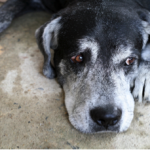I wanted to talk to you about a common condition the doctors see at Steeples Veterinary Clinic, namely … vomiting and diarrhea or gastroenteritis. I know … not a lovely subject, but I do know a lot about it because animals frequently come here suffering from one or the other or both.
Gastroenteritis means inflammation of the stomach and intestines. It’s usually mild and short-lived, and it seems to be really common this time of year at Thanksgiving and later on at Christmas. When dogs get into the garbage and eat the turkey carcass or the left over bacon or the whole pumpkin pie off the counter … yep, they get sick.
Eating the wrong food or “garbage guts” is common in dogs (not so much in cats, though, as we have more discriminating tastes!). Up comes the offending food along with fluids and electrolytes in the vomit or diarrhea
So what? Well, your pet feels awful, as you can imagine, and both symptoms can lead to dehydration and an electrolyte imbalance that makes everything worse. Your pet is usually lethargic, may have a slightly tender belly, and may have a low grade fever.
The thing is, these signs, including the vomiting and diarrhea, can also be seen with other diseases and conditions that are more serious than just overeating the wrong food. That’s why it’s important to not wait too long. If your dog or cat is doing a lot of vomiting and diarrhea and has no energy to even get up, get him to your veterinarian.
They will examine him and may recommend tests to rule out serious conditions. They may also just give your pet some fluids and medications to make him or her feel better until the offending food has left the body. It’s a win-win.
The best thing is to not let your dog get into the carcass, the garbage, the bacon, the stuffing, the whatever. But dogs will be dogs. And yes, occasionally cats, too. No, dogs won’t BE cats … oh, you know what I mean.
What I do know is that when they get into all those things, and they’re sharing the vomiting and diarrhea experience with you, it’s time to make a call to your other family doctor, your veterinarian!
And that’s what I know about that. (Too much, really).





